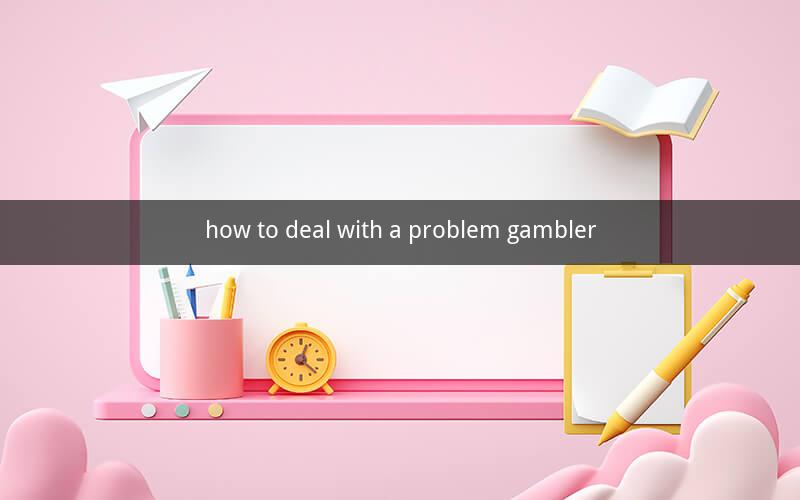
How to Deal with a Problem Gambler
Table of Contents
1. Understanding Problem Gambling
2. Signs and Symptoms of Problem Gambling
3. The Impact of Problem Gambling on Individuals and Families
4. Strategies for Identifying and Helping a Problem Gambler
5. Communication Techniques
6. Professional Help and Support
7. Setting Boundaries
8. Encouraging Self-Reflection and Change
9. Creating a Supportive Environment
10. Long-Term Support and Recovery
1. Understanding Problem Gambling
Problem gambling, also known as gambling disorder, is a progressive condition characterized by an inability to control gambling behavior. It can lead to significant financial, social, and emotional problems. Understanding the nature of problem gambling is the first step in dealing with a problem gambler.
2. Signs and Symptoms of Problem Gambling
Identifying the signs and symptoms of problem gambling is crucial for intervention. These may include:
- Preoccupation with gambling thoughts
- Needing to gamble more money to achieve the desired excitement
- Feeling restless or irritable when attempting to cut down or stop gambling
- Returning to gambling after losing money to recoup losses
- Lying to hide the extent of gambling
- Neglecting responsibilities at work, school, or home
- Borrowing money or selling possessions to fund gambling
3. The Impact of Problem Gambling on Individuals and Families
Problem gambling can have devastating consequences. Individuals may experience financial ruin, relationship breakdowns, and mental health issues. Families may suffer from emotional distress, financial strain, and the loss of a loved one's support.
4. Strategies for Identifying and Helping a Problem Gambler
To help a problem gambler, it's essential to approach the situation with empathy and understanding. Here are some strategies:
- Educate yourself about problem gambling
- Express concern without judgment
- Encourage open communication
- Offer support and resources
- Be patient and persistent
5. Communication Techniques
Effective communication is key to addressing problem gambling. Consider the following techniques:
- Use "I" statements to express your feelings without placing blame
- Listen actively and without interrupting
- Avoid confrontational language
- Validate the problem gambler's feelings
- Focus on solutions rather than problems
6. Professional Help and Support
Seeking professional help is often necessary. Therapists, counselors, and support groups can provide guidance and support. Here are some options:
- Individual therapy
- Couples counseling
- Family therapy
- Gamblers Anonymous
- Gamblers Anonymous Family Program
7. Setting Boundaries
Establishing clear boundaries is crucial for protecting yourself and your loved ones. Consider the following:
- Limit access to gambling resources
- Avoid discussions about gambling
- Establish financial boundaries
- Create a safe and supportive environment
8. Encouraging Self-Reflection and Change
Encourage the problem gambler to reflect on their behavior and consider making changes. This may involve:
- Identifying triggers for gambling
- Developing a plan to avoid these triggers
- Setting goals for change
- Seeking accountability from friends or family
9. Creating a Supportive Environment
A supportive environment can help a problem gambler stay on track. Consider the following:
- Encourage participation in healthy activities
- Provide opportunities for social support
- Celebrate successes and milestones
- Avoid enabling behaviors, such as bailing out the problem gambler financially
10. Long-Term Support and Recovery
Recovery from problem gambling is a long-term process. Ongoing support and commitment are essential. Here are some ways to maintain long-term recovery:
- Continue attending support groups
- Stay connected with friends and family
- Seek professional help as needed
- Practice self-care and stress management
Questions and Answers
1. Q: How can I tell if someone is a problem gambler?
A: Look for signs such as preoccupation with gambling, financial difficulties, and neglecting responsibilities.
2. Q: What should I do if I suspect a loved one is a problem gambler?
A: Express your concern without judgment and offer support. Encourage them to seek professional help.
3. Q: Can problem gambling be treated?
A: Yes, problem gambling can be treated through therapy, counseling, and support groups.
4. Q: How can I help a problem gambler stop gambling?
A: Encourage them to seek professional help, set boundaries, and create a supportive environment.
5. Q: Is it possible for a problem gambler to recover?
A: Yes, recovery from problem gambling is possible with the right support and commitment.
6. Q: How can I support a family member who is a problem gambler?
A: Educate yourself about problem gambling, offer empathy, and seek support for yourself as well.
7. Q: Can a problem gambler's behavior affect their children?
A: Yes, a problem gambler's behavior can have a negative impact on their children's emotional and financial well-being.
8. Q: What resources are available for problem gamblers?
A: Resources include therapy, counseling, support groups, and hotlines.
9. Q: How can I help a friend who is struggling with problem gambling?
A: Offer support, encourage them to seek help, and be patient as they work through their issues.
10. Q: Is there a difference between problem gambling and addiction?
A: Yes, problem gambling is a specific type of addiction characterized by an inability to control gambling behavior.